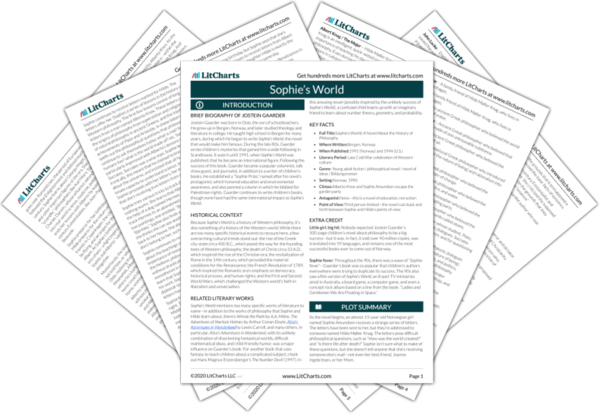Summary
Analysis
Hilde sits in bed, having just finished another chapter of Sophie’s World. She remembers how her father used to read the book The Adventures of Nils to her. Hilde also remembers buying a book on astrology last year. Her father lectured her on the shallowness of astrology and spiritualism.
We see that Sophie’s disagreements with Alberto correspond roughly to Albert’s disagreements with Hilde (as we might expect).
Themes
Hilde proceeds with her reading, since there are only a few pages left. In the book, Sophieand her Mom prepare for the garden party. Mom asks Sophie about the book she’s bought, a book titledSophie’s World, by Albert Knag. Sophie claims that Alberto gave her the book. Mom says that she read the first page of the book—it’s about a girl named Sophie Amundsen.
As in the bookstore scene,Gaarder adds another layer of meta-fiction to the text here: Sophie’s World is now a book, written into a book, written into a book! This is an early sign that the structure of “Sophie’s world” (not just the book, but the whole world) is slowly coming apart.
Themes
Sophie and her Mom—whose name, we learn, is Helene—see a group of demonstrators walking down the street. The demonstrators carry signs saying, “The major is at hand” and “More power to the UN.” Helene can’t understand what this demonstration is all about, and Sophie replies, “A mere bagatelle.” A little irritated, Helene tells Sophie that she doesn’t believe in philosophy at all—“everything is synthetics nowadays.”
Relatively small events in Hilde’s world (like Albert’s return from Lebanon, or Hilde’s birthday) become huge, quasi-religious events in Sophie’s world. It’s a sign of Sophie’s growing maturity that she repeats Alberto’s catchphrase, showing that she’s mastered many of the lessons he’s taught her.
Themes
The party is about to begin: there are streamers and beautiful Japanese lanterns in the trees. There’s a cake and lots of other foods. The guests arrive one by one, including Joanna (whose parents drive a white Mercedes) and Sophie’s classmates, Jeremy and David. Soon, the only guest who hasn’t arrived is Alberto.A short while later,Albertoarrives, carrying a bouquet of 15 red roses. Helene introduces Alberto to everyone as “Sophie’s philosophy teacher.” She insists that Alberto isn’t her boyfriend. Everyone cheers. Suddenly, Joanna gets out of her chair and kisses Jeremy on the lips. Helene seems oddly calm; she just mutters, “Not at the table.” A moment later, Sophie asks Joanna why she kissed Jeremy. Because he’s so cute, Joanna says.
This is one of the only extended descriptions of “Sophie’s world” in all of Sophie’s World. In other words, it’s one of the only times when Sophie interacts at length with people other than Alberto or her mother. This should remind us of the Allegory of the Cave: having achieved a kind of enlightenment, Sophie has returned “underground” to find that her peers seem particularly shallow and uneducated (but also increasingly absurd, as the book’s sense of reality spins out of control).
Themes
Get the entire Sophie’s World LitChart as a printable PDF.

The party goes on, with everyone eating and talking. Helene stands up and makes a speech. She congratulates Sophie on her birthday, and mentions that Sophie’s father is frequently far away, often in other countries. The guests applaud, and Jeremy and Joanna begin kissing once again.
Absurdity and comedy becomes more and more the norm in Sophie’s world. The adults seem scattered and confused, while Sophie’s peers seem exaggeratedly childish and simple-minded.
Themes
Alberto rises—he wants to make a speech as well. He tells the crowd that Sophie has been learning about philosophy for the last few weeks. Here, tonight, he and Sophie will reveal their “findings”—the “innermost secret of existence.” The world, Alberto continues, is the creation of a man named Albert Knag. Everyone at the party is a literary creation, designed for a book—a book that Hilde is about to finish. The guests at the party don’t take this news well. Some shout, “Garbage,” while others beg for insurance coverage.
Just as Plato prophesized, news of enlightenment is greeted with anger and hatred by the unenlightened. Of course, in this scene the guests’ small-mindedness is exaggerated and played for comedy.
Themes
Alberto turns to Sophie and says, “It’s time.” Helene asks Sophie if Sophie is planning on leaving. Sophie admits that she is. Helene says that she’ll miss Sophie, but Sophie points out that this isn’t true—nobody will miss anybody, since they’re all imaginary. Suddenly, Joanna tells her mother that she’s pregnant.
As reality seems to break down, so too do the human relationships previously established in the book. Sophie and her Mom, in particular, now seem to have moved into the realm of abstraction.
Themes
The guests become increasingly rowdy—the boys throw food everywhere and the girls pop balloons with a pin. Someone crashes the white Mercedes into a tree. Sophie remembers a time when the house was her Garden of Eden—now, Alberto reminds her, she’s being “driven out.” Alberto places his hand on Sophie’s shoulder and shouts, “Now!” With this, Alberto and Sophie disappear. Helene proudly says, “They have vanished into thin air,” and offers her guests coffee.
The symbolism of this scene is clear enough—Sophie explicitly mentions that she’s being driven out of terrestrial paradise. When Sophie began her philosophy lessons, she was innocent and straightforward in her thinking. Now, she’s learned to question everything in her world, even the world itself. The question then becomes: has Sophie’s education made her any happier, or was her ignorance bliss?
Themes












